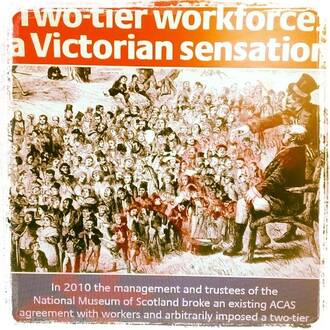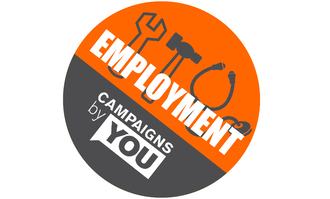-
End the two-tier workforce at National Museums of ScotlandIn 2011 the management of National Museums Scotland broke an existing ACAS agreement and arbitrarily and unilaterally imposed a two-tier wage structure upon its lowest-paid workers (principally Cleaners, Visitor Services Assistants, Housemen, Security) without consultation or negotiation with the recognised Trade Unions. Staff employed since 1st January 2011 are on reduced terms and conditions without a weekend working allowance which is paid to compensate for having to work anti-social hours. Many of this lowest paid group only get one full weekend off once every seven weeks, which has a detrimental impact on family and social life. The consequence is that low-paid workers on the same shifts, doing the same work, are being paid up to £3,000 less than their colleagues. These workers make the National Museums Scotland the top rate attraction it is, and it is only fair that they get paid properly for their hard work. The Joseph Rowntree Foundation states that those earning under £17,100 a year are being paid a Poverty Wage, and many of our members earn well below that. Senior Scottish Politicians, in opposition against Westminster, have recently been calling for recognition of weekend working payments for those who give up valuable family and social time. These payments make up a large part of low-paid workers’ take home pay. PCS totally agree with safeguarding weekend working rights, and believe that if it is good enough for other workers, then National Museums Scotland staff deserve this too. Both Museum management and the Scottish Government need to embrace the principle of recompensing weekend work and accept PCS proposals to settle this long- running dispute. We do not believe that low-paid culture workers deserve to suffer at the hands of austerity, especially when heritage and culture contribute so much to the Scottish economy. The Museum’s own figures show that it contributes £65million to the economy. PCS Members at the National Museums of Scotland have been taking part in discontinuous strike action for over 2 years. Despite repeated requests to come to a negotiated settlement with management, this has not happened.2,786 of 3,000 SignaturesCreated by Clara Paillard
-
Save our long-standing community of small businesses and craftsmen in Highgate, London, N6.The recent sale of 191-201, Archway Road, London N6 5BN to Investland/ Archway Apartments is threatening the livelihood of a long-standing group of small businesses, entrepreneurs, sole traders and craftsmen, who provide a wide range of services to the local North London community. The proposed development seeks to completely demolish the independent work-units currently used by this diverse collection of small businesses in order to build a new block of luxury flats, also housing a supermarket. The impact of yet another major supermarket would not only destroy the livelihood of the many small independent grocery businesses in the Archway road area, but would also create a major increase in traffic congestion in what is already an overly congested area. A wide range of small independent businesses currently operate from these premises, including highly experienced health and fitness professionals, a media production company, carpenters and joiners, therapists, a painter, and a tailor and clothing designer. Some of these businesses have been providing valuable services to the local Highgate community for decades, and face eviction if these proposals were to go ahead. The proposed new development plans would also mean the eviction of the residential tenants currently living in the block, some of whom have lived here for over thirty years. A report published in 2015 by Sussex Innovation, the business incubation network owned by the University of Sussex, found that two thirds (63%) of small business owners in London and the South East are considering leaving central London due to the lack of affordable business premises in the capital. This is not just a local Highgate issue, but is in fact representative of a growing problem effecting small businesses across the country, where short-sighted and profit-focused property developers are destroying the very heart and soul of local communities in Great Britain. You can watch a short video about the plight of this small business community by clicking the following link: https://vimeo.com/136233275 Please sign this petition and support our cause in defending the livelihood and employment of these small businesses, sole traders and craftsmen working in this building complex, and other small business communities in similar situations throughout the U.K.86 of 100 SignaturesCreated by Cheyne Towers
-
Regulate the Probate Services IndustryCurrently the probate services industry handles in excess of £1 billion of assets every year. Yet there is no regulatory body to watch over the companies that provide probate services. In fact, anyone who is reading this could quite legitimately become a provider of probate services and handle £100,000's of assets left to others in the wills of deceased people, including cash, savings and property without being answerable to any authority. Because of this incredible lack of regulation, many companies who offer complete probate service packages can quite literally do as they please with the assets of a deceased person whilst working under the guise of the probate process, often taking literally years to complete fairly basic cases. Many companies in this industry use delaying tactics to ensure interest is earned on estate assets, without passing it on to beneficiaries. There are many reported cases of companies over-charging, lying and deceiving customers, often to cover up mis-handling of cases. Many firms have deals with high street banks which give them automatic access to the bank's deceased customers' personal details and account information and work to convince relatives or executors of the deceased that the probate process is a very difficult system to negotiate. These companies often use leaflets placed at Registry Offices which falsely appear to be provided by charities officially endorsed by Local Governments. The probate industry must be regulated by an official body who can effectively ensure that the companies which deal with the financial assets and properties left to beneficiaries pass the assets over to them speedily, accurately and without causing any undue extra stress on bereaved people. What other industry could handle such high value personal financial assets without coming under regulation in the UK? None, so it is imperative that the Probate Services Industry is brought into line to eradicate the deep-seated 'cowboy' companies, some of whom are currently the largest providers of these services in the UK.251 of 300 SignaturesCreated by Mark Burden
-
Stop the cuts to trainee GP payWe are currently in a GP recruitment crisis, with applications for GP training schemes falling every year. The suggested plans to cut GP registrar pay will exacerbate this trend and put even more junior doctors off a career in general practice. This will worse the current severe shortage of appointments, leading to poor patient satisfaction and putting patients at risk. The government say they want to hire another 5000 GPs by 2020, but this massive pay cut will make this an impossible target. This is another ideological attack on the NHS and its workers.166 of 200 SignaturesCreated by Josh Cullimore
-
Reinstate Iain YellIain Yell worked for HMRC in the Triad in Bootle, where he was part of the Benefits & Credits section. He was dismissed at the end of June through the department’s attendance management policy. Iain suffers from depression, and all of his absences were related to this condition. Hardly at record levels, they were in fact tapering off because of his own efforts to better manage his condition. In spite of this a single period of absence, provoked by the side effects of a reduction in medication which he had agreed with his doctor, was used as justification that his absences were ‘unsustainable’ and that he had to go. Iain’s rep had argued that a much greater portion of his absences, if not all of them, should disregarded by the poor attendance hearing since they were disability related. Management refused to even disregard a full quarter of Iain’s absences, despite every one of them being as a result of his disability and his Occupational Health referral stating that he was likely to be covered by the terms of the Equality Act 2010. In PCS’s view, the refusal to disregard all of Iain’s disability related sickness absence for managing attendance purposes amounts to discrimination arising from disability and the dismissal decision must be reversed.765 of 800 SignaturesCreated by Phil Dickens
-
Free medical care for apprenticesThe government are currently bringing in more companies and small businesses to run apprenticeships within the work place. However once you have an apprenticeship you are not entitled to the same privileges to someone the same age without an apprenticeship if you want a prescription or dental care. Currently someone on an apprenticeship's minimum wage you earn £2.73 an hour, so if you need to get a prescription at a cost of £8.20 then this is roughly 3 hours work just to pay for it! I say we as apprentices should be allowed to have free prescriptions and free dental care.52 of 100 SignaturesCreated by Liam Jenner
-
PROTECT NHS CHILDREN'S SERVICES IN BRISTOL & SOUTH GLOS FROM PRIVATISATIONNHS children's community health services and the inpatient adolescent mental health service in Bristol & South Gloucestershire are in the process of being recommissioned. The first stage of this campaign has already been successful with the recent announcement that the interim contract to deliver community children's health services for one year during 2016/17 has been won by a partnership made up of Avon and Wiltshire Mental Health Partnership NHS Trust (AWP) and two social enterprises, Sirona Care & Health CIC and Bristol Health CIC. The adolescent inpatient mental health unit, the Riverside Unit, will also be provided by AWP, with private company The Huntercombe Group, acting in a 'consultancy' role. However, AWP will be running the unit on a day-to-day basis and staff will be employed by AWP, so it will essentially remain within the NHS. The demand that services remain integrated has also been won, with the announcement that for the longer-term contract these services will be commissioned together by the Clinical Commissioning Groups and their partners. However, the campaign is not over yet. The next stage of the process during which the same services will be commissioned for the next 5 or 7 years from 2017 has begun. We must keep the pressure on to protect children's health services in Bristol for the long-term. And now we know it can be done! The next stage of this campaign will focus on bringing all of these services entirely back into the NHS for the long-term. We know private companies are planning to bid to run them. There should not be a role for companies who seek to make a profit or for social enterprises (many of whom operate in a similar way to private companies) in the delivery of our health services. There are two reasons why this campaign is vitally important: Firstly, children and young people in Bristol and South Gloucestershire need to get the best possible care and treatment. This means having services which are integrated and can work together, provided by people who are interested in delivering top quality care, not making maximum profit. Secondly, every time an NHS service in the UK is privatised we are a step closer to a US-style health system which would mean the end of free-at-point-of-need healthcare. The evidence is mounting that this government is not fully committed to a future publicly-owned health service. We are a group of concerned local people, including service users and NHS staff, who understand how damaging the consequences of moving these services to a private provider could be. We think the principle of 'people before profit' in the NHS is fundamental in Bristol, South Gloucestershire and the rest of the UK. Join our campaign at https://www.facebook.com/ProtectCCHP or search 'Protect CCHP' on Twitter for more information.6,982 of 7,000 SignaturesCreated by Nathan Williams
-
Fair pay at National Museums WalesOut of 600 staff working at National Museum Wales across seven sites, the front of house/visitor services constitute 300 or nearly 50% of the total. They deliver the services that allow the museums to remain open to the public, from cleaning and maintaining the sites to delivering guided tours, demonstrating traditional crafts and ensuring the safety of the National Collections. In total the seven sites host 1.6 million visitors a year, ensuring the cultural and historical heritage of Wales and bringing huge economic benefits to the country. Front of house staff are predominantly the lowest paid in the museum. Many work as many as 47 weekends a year for which they are paid an allowance to compensate them for the ant-social effects this has on their family and social life. After five years of cuts and pay freezes the Museum Management are now seeking to remove these payments which can amount to £2,000 - £3,000 for full-time staff. Many members are already classified as low-paid and face the risk of being pushed into poverty by these cuts. Members face the risk of using food-banks to survive and the increased likelihood of child poverty amongst their families. PCS are the largest union within this section of the workforce and represent 80% of Front of House staff. They have been fighting management proposals for nearly 18 months and believe it is wrong that those who can least afford it, should shoulder the burden of cuts while Senior Managers enjoy effective pay rises. We believe that pay cuts to the lowest paid is a social justice issue that everyone should be concerned by. Our campaign highlights the real impact that austerity has, with those least able and most vulnerable to cuts facing the heaviest hardship.13,008 of 15,000 SignaturesCreated by Clara Paillard
-
MP's should vote to reject their 10% payrise.The government is cutting funds all over the UK child poverty is on the rise and will increase further. Services are being decimated, it is completely immoral for MP's to get such a rise when the public sector gets nothing97 of 100 SignaturesCreated by Bernie Flatley
-
Increase the threshold for Pay to StayWhilst many of us do agree that high earners should probably pay more for living in social housing, an entire household on £30,000 (or £40,000 in London) a year just isn’t high or wealthy. That would consist of a couple earning just £15,000 each, and we know how hard it is to get by on that meagre amount. The current government are contradicting themselves when they say they’ll “make work pay” and they’re the party for the workers; yet if a social housing tenant works, they will now be penalised for it. If you live in social housing and you work, you will now face the prospect of losing your home. Many of these working families in social housing (just like most other people) have aspirations to get out of the poverty trap and use the opportunity of social housing to save for a deposit to one day buy their own home, thus freeing up the home for the next family who needs it. Now it is as though they are not allowed to have dreams or better themselves. All hope of saving for a decent mortgage have been ripped out from under their feet while they are pushed back down into the ground where they apparently “belong”. It is increasingly depressing that there is near to no hope for people’s futures. Mortgages aside, many families, especially those with children, will find it increasingly hard to manage day to day. These families could be forced to private rent, but not their own self contained flat as before, as the rents would again be too high, they will be forced into renting a room and sharing a house. Is this the way a family should live? We are regressing back to the days of overcrowded houses with notorious rip off landlords. The ONS says that a family of four will spend on average £517.30 per week. If both parents earned a total of £31,000, they would (after tax), have only around £465 to spend per week, this is well below the UK average. When their rents are raised to market level, where will they get the extra money from? This will result in more poverty, tenants giving up jobs or reducing their hours to earn under the threshold, or in worst case scenarios, couples splitting up or living apart to avoid being penalised for having a job or older working children being kicked out to reduce the household income. If these children are under 21, and on a low wage, how will they find housing without a Housing Benefit top up? Let’s cut out the “luxuries” of living, the ONS estimates that to live basically (rent/mortgage not included), a household will spend an average of £350 a week on bills, food, basic clothing, travel and health. This would leave a £30,000 earning home with about £100 a week to spend on their social housing rent. The average UK market rent is £960 per month, or £222 per week. How will these households meet the shortfall of market rent? Where will these families go? This petition is to ask for consideration that the threshold for Pay to Stay be increased to at least £60,000 per household (£70,000 for London). This would ensure that the average family is able to live without poverty, keep a roof over their head and still be able to save a little each month for a deposit to buy their own home, freeing up social housing without first making more people homeless. The current proposed threshold will only make one family homeless to rehome another, thus not bringing down homeless levels, and increasing the housing benefit spend. A consultation paper was produced which asked the opinions of experts in the field – Local Authority landlords, Private Registered Landlords, Tenant Representative Bodies, Private Landlords, and Individuals. A brief quote from the paper is below. Why was there a consultation when the majority of the views were not taken into account? “About a third of respondents thought that the threshold of £60,000 was appropriate. A smaller proportion thought that £80,000 should be the minimum, while the least favoured was £100,000. Social landlords largely preferred £60,000. There were also views that the threshold could be lower than £60,000, though not a consensus in favour of lowering the threshold. If the threshold was below £60,000 it could act as a disincentive to work, particularly for larger households and in high demand areas such as London. Those who favoured the threshold of £60,000 suggested it was reasonable and consistent with other Government policies involving income thresholds, such as access to affordable home ownership (although it was noted that the threshold may need to be adjusted to £74,000 for London, to align with London schemes) and the child benefit “cap”. There were also views that no more than 30% of a household’s income should go on housing costs; otherwise, it could start to impact detrimentally on the household’s budget.”3,280 of 4,000 SignaturesCreated by Mandy B

-
Defend The Right To StrikeWorkers' rights must be protected, and not left wide open to exploitation by Government, multinational corporations and unscrupulous employers. Plans for the biggest shake-up of strike rules in 30 years would make holding dodgy employers to account almost impossible. Please sign the petition to stop the government sweeping away our rights at work now.12,251 of 15,000 SignaturesCreated by Jo Green
-
Protect The Living WageThe Living Wage is a concept which has been developed independently and it should not be hi-jacked by the Chancellor because he wants to pass the Minimum Wage off as something it is not. Only The Living Wage Foundation can set the Living Wage, by its own independent processes and no one, not even the Chancellor, can think of any other amount and pass it off as the real thing!141 of 200 SignaturesCreated by John Logan
Hello! We use cookies to improve your experience by providing insights into how the site is being used. Find out more.












